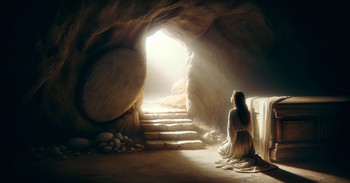Is God in all things? As a Christian, I can answer this both with a No and a Yes. Which response I give really depends on just what is meant by the person asking the question.
This article will look at these two distinct responses and when each may be appropriate.
Pantheism and Panentheism
Pantheism is the belief that the material and the divine are one, there is no distinction between them. God is the universe, and the universe is God.
Everything that exists is a part of the divine. In pantheistic belief, God is in all things, because all things are God.
There are several forms of Panentheism, but basically, it is the belief that the divine permeates every part of the material world but is distinct from it.
In essence, the divine is the spirit of the universe. The universe is not God, and God is not the universe, they are distinct. But at the same time, God is dependent on the universe.
God cannot exist apart from a material universe. So, although in a different sense, panentheism would also say that God is in all things.
Deism
Deism is the belief that God created the universe, but he is not involved in it. In deism, like panentheism, God is distinct from the material world. But unlike panentheism, deism holds to a God that is not dependent on the material for his existence.
Also, unlike panentheism, which holds to God being in his creation, deism contends that God is external to the material creation and is not in it. So, the deist would answer the question, “Is God in all things?” with a no.
Christianity
Christianity is distinct from pantheism and panentheism as well as from deism. For us, God is distinct from the created universe and is not dependent on it for his existence.
While this is in line with deism, it is at odds with the pantheistic belief that there is no real distinction between God and the material world.
And it is at odds with the panentheistic belief that God is dependent on the material world for his existence. Christianity holds to a God who is eternal, and not dependent on a material world.
A God who created ex nihilo, from nothing. A God who exists as a perfect being without a material world.
Where Christianity and deism differ is in God’s involvement with the material world. The deist would understand God to be at best a passive observer of what is happening in his creation.
And some would go so far as to say that he was unable to interfere within the creation. Christianity, on the other hand, views God as actively involved with the governance and preservation of his creation, moving it along to his intended purpose.
Is God in All?
So, is God in all things? I believe that he is. But not in the way that a person holding to either pantheism or panentheism would understand it.
As Christians, we believe that, while God is transcendent, or external to, and independent of, the universe, he is also immanent, or at work in it. While the universe cannot fully contain God, he is working in it.
The doctrine of God’s omnipresence also makes this claim of God being in his creation. There is nowhere in all of creation where God is not. Psalm 139:7-12 expresses this very eloquently.
Where can I go from your Spirit? Where can I flee from your presence? If I go up to the heavens, you are there; if I make my bed in the depths, you are there. If I rise on the wings of the dawn, if I settle on the far side of the sea, even there your hand will guide me, your right hand will hold me fast.
If I say, “Surely the darkness will hide me and the light become night around me,” even the darkness will not be dark to you; the night will shine like the day, for darkness is as light to you.
There are two passages from Paul that point to God being in all things. The first is in Ephesians 4:6 where he says that there is “one God and Father of all, who is over all and through all and in all.”
And the second is in Colossians 3:11, where he says that “Christ is all, and is in all.” In context, both passages are referring to unity within the body of Christ and not to God’s being in all of the created order.
But I do believe they are an appropriate answer to the question at hand. Is God in all things? Yes, and this is especially true concerning the church.
A Simple Illustration
A simple illustration may help to explain the difference in these four distinct views of God and his creation, as well as in how they answer the question. Imagine God as a man and the material world as a coat.
Pantheism says that the man and the coat are one and not separable. So, the man is in the coat.
Panentheism says that the man and coat are distinct, but the man cannot exist without the coat. Here also, the man is in the coat.
Deism would agree that the man and coat are distinct. And deism would say that the man manufactured the coat. But it would claim that the man could not wear the coat. He is not in the coat.
Christianity would also agree that the man and coat are distinct. And, also, that the man produced the coat.
But Christianity differs from deism by saying that the man has chosen to wear the coat. Here, the man is in the coat.
So, for Christianity, God is distinct from the material world, and not dependent on it, but is still in all things.
For further reading:
What Is Deism? What Are Deism Beliefs?
What Is the Difference Between Religion and Spirituality?
Can Someone Be Saved by Just Seeing Creation?
What Does it Mean That God Is Transcendent?
What Does it Mean That God Is Omnipresent?
What Is the Meaning of the Body of Christ?
Photo Credit: ©iStock/Getty Images Plus/Romolo Tavani




